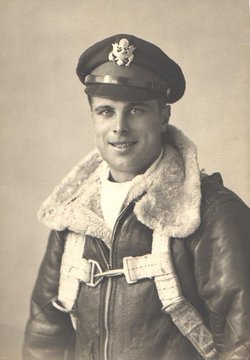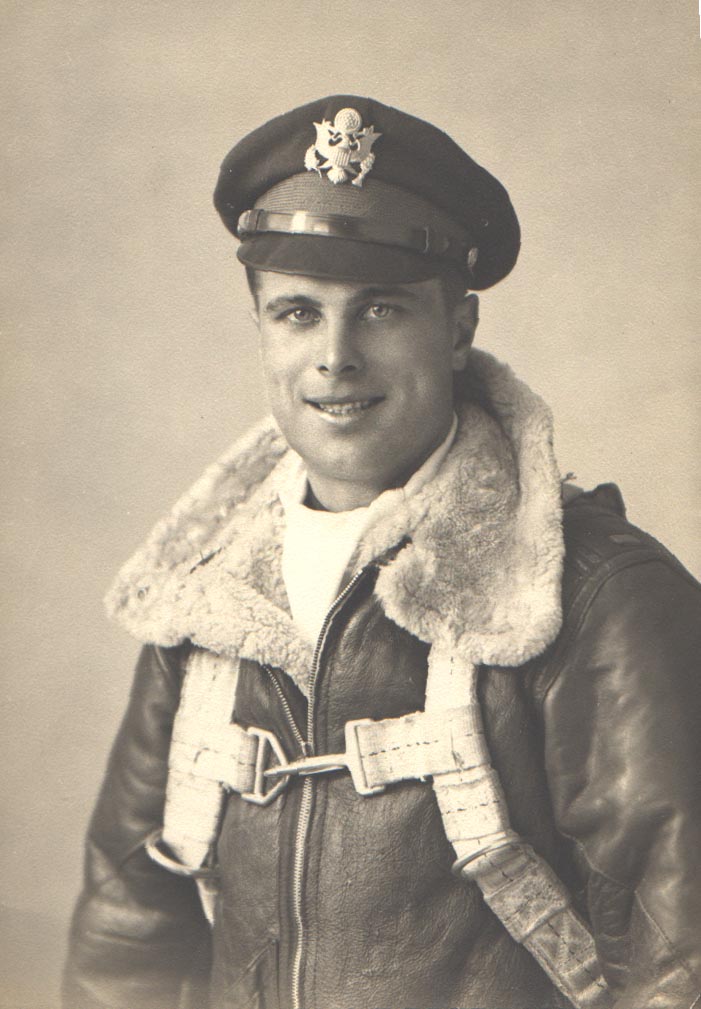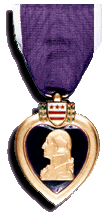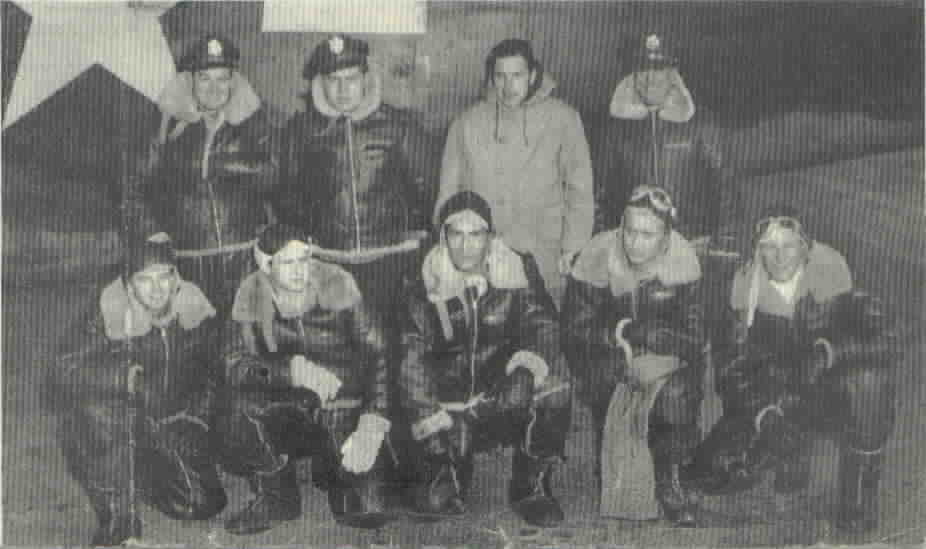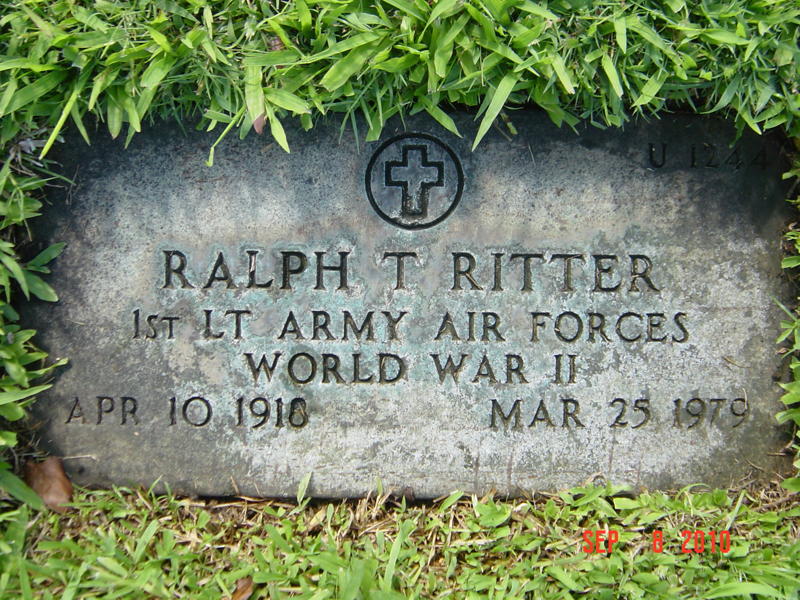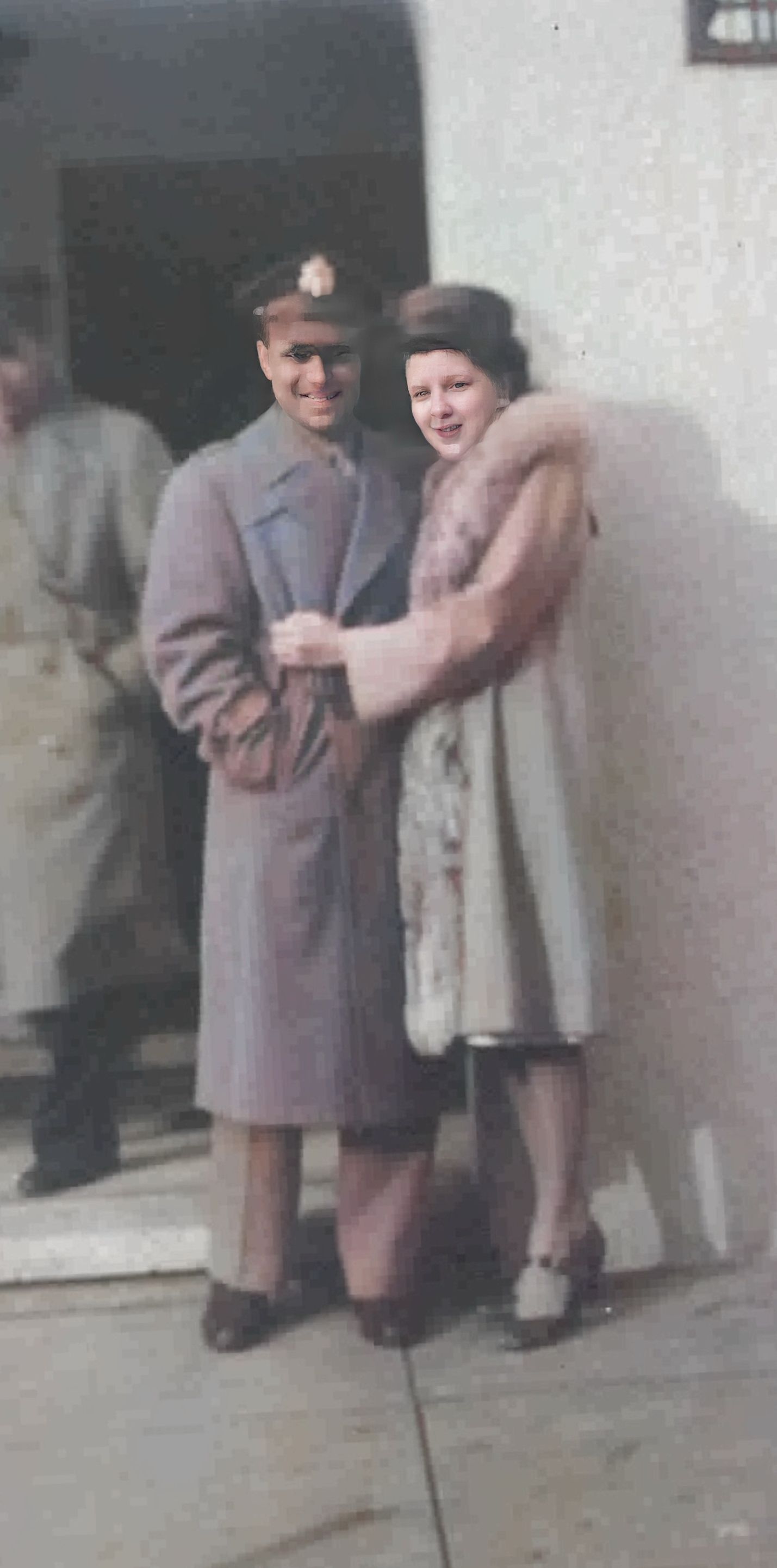Ralph married three times.
1. Lorraine Barbara Meyer (1918-1997) - married on 30 Apr 1938 in San Francisco, CA. The have one daughter: Dawne. At the time of their marriage, Ralph was a typist for a Petroleum Company and Lorraine was a stenographer for an Executives' Assoc. Ralph has three grandchildren from this marriage.
Lorraine and Ralph met each other at Commerce High School in San Francisco, CA.
2. Willie Ann Stout (1925-2005) - married July 17, 1948 in unknown location. They had two daughter, Pam and Lani. Ralph has three grandchildren from this marriage.
3. Wilma Joyce Avant - no other information is known.
Some remembrances from Nancy about her Uncle Ralph:
Uncle Ralph was always a barrel of laughs. When he would come back to the states from Saudi Arabia, he'd fly in on TWA. We'd watch the plane roll up to the gate and a red carpet was rolled out for the first class passengers. I was always thrilled to see this happen. He would stay at Gama's, but visited us many times while he was here. He would play games with Mom and drink Shasta soda. When he was married to Willie, their daughters would come too and even though I was older, I thought the world of them. When he married Billie, he decided to retire to Hawaii. He built a large house with too many bathrooms. Mom said it was because he didn't have enough in Arabia.
Here is a short story about when he went on vacation as told to me from my mother:
We drove to Grants Pass, Oregon, which took many days of driving. One particular event comes to mind. The road was a narrow two lane. There were lots of windy roads going up the mountain. The car was a touring car with a running board. It had Eysing glass windows, which were thick, but not glass, white and clear and bendable. There were metal accordion storage places. It was a nice car, but Dad liked Studebakers. During these trips, the inside of the car was piled high with our clothing, and other vacation stuff. I sat up high almost to the ceiling and would get carsick because the roads were windy. I'd say, "Mother I'm getting sick to my stomach." She would give me a coffee can and say, "Use this to get sick in and don't think about it." I thought she was a Christian Scientist because of their mind over matter beliefs. Ralph sat in the front with Dad. Another car came from the opposite direction and wanted to pass. My mother got out of the car and told me to get out, which I didn't. Ralph wanted to stay with Dad. Slowly Dad drove the car along the narrow road. The right tires were right on the edge of the cliff. After the other car past, my mother and I climbed back in the car and we continued with our trip
========================
A comical tale in the Ritter household is when my father won some chickens at a Whist game. He brought home four little chicks and we raised them. Ralph picked out the largest chicks and as luck would have it, mine grew up to be the biggest. One day in the basement I was standing quietly watching the grown chickens. My father caught them and one by one he chopped off their heads. The chickens ran around in circles and it scared me terribly. I ran upstairs. Later in the evening, Mother cooked the chickens for dinner and I wouldn't eat them. I told Ralph what happened and he didn't eat either.
========================
Christmas: My father always brought home a tree about a week before Christmas. It must have been about 6' as it reached the top of windows in the living room, on a wooden box. My mother brought up all the decorations from the basement. As a preschooler I use to think how long it took my father to put the string of lights on. I was always anxious to start hanging the ornaments on the low branches. As years went by I observed more closely how he did the light strings and as I grew taller, I could reach the higher branches. My mother would tell me if I had ornaments too close together of the same kind. They were of all different shapes and colors except for alot of dried walnuts with strings attached to hang. I thought they were ugly but never commented as they did fill up the tree. My mother and I did the rest of the tree and I was told to put one tinsel strand on the tree at a time. Ralph wasn't interested in helping, and it didn't matter to me, as I was happy doing it. We all opened our presents on Christmas Eve. I was given a very small amount of money to buy a gift for my mother. She did all the others, but as I think about it now I can only remember one gift I gave to my mother which was a washrag .I thought it was beautiful, some plain light color. My mother told me much later in years that she never actually got a Christmas gift from my father. He always stuck an envelope with a 20 dollar bill in the tree and it never changed. My father worked the day shift and home for Christmas eve. Ralph and I were sent to our room around 8pm because we were told that Santa Claus was going to ring our doorbell to bring gifts because our chimney was closed off and he couldn't come down it. Actually, my father is the one who went outside and rang the doorbell. Ralph probably was told by my mother not to say a word about there being no such person as Santa Claus once he reached the age of knowing what was going on. Ralph was not a tease at any time. If my father had to work the 3pm - 11 pm shift, we went to bed but were awakened when he got home before midnight and opened our presents then. Xmas day was our big dinner—always Turkey, stuffing, mashed potatoes, and some kind of vegetable such as string beans or peas and candied yams we always had mince and pumpkin pie. Apple pie was on other occasions when company came for dinner.
========================
"He Flew In and Flew Out"
Editor's Note. One of the best stories to come out of the war concerning one of our employees will have to wait until the end of hostilities before it can be told in full. When he bailed out of a crippled bomber high over the enemy's homeland, an enemy-occupied country, and near a neutral country last May, Lt. Ralph T. Ritter of the Home Office Purchase and Stores Department floated down into a series of adventures that spanned several months, with a happy ending back in California a few weeks ago. This much of Ralph's story, however, the censors permit us to tell.
Flying from England May 11 on his sixteenth mission as Bom¬bardier on a B-24 Liberator, Lt. Ralph Ritter dropped his bombs on the con¬tinental target through a "blanket" of heavy flak, some of which hit his plane. Enemy fighters then attacked and knocked Out two motors. They headed toward the neutral country, but the third motor was knocked out and the fourth burst into flames. "There was a heavy fog and we weren't certain where we were," Lt. Ritter said on a recent visit to the Home Office. "All ten of us bailed out and landed safely within a radius of 20 miles." (Here there is a lapse of several months in Ralph's tale.) "We got along all right, except we all suffered from malnutrition," Ralph stated. "We ate the same thing the citizens did but it was a poor diet— too much starch. For breakfast we had coffee, a piece of toast and cheese. For lunch and dinner we had potatoes, spaghetti, or rice, with soup made from rice or potatoes left over from the day before."
In September Ralph and his pilot, Stewart Goldsmith of Akron, Ohio, decided to make an attempt to return to the fighting front. "Stewart made a pretty good looking girl," Ralph recalls. "He had a bandanna over his head, a woman's suit and high stockings. In fact, he looked fine until the afternoons wore on. Then he would get tired and his eyes would get dark and his beard would begin to grow. I didn't do so bad in peasant's garb, either." Several days of traveling at this point in Lt. Ritter's narrative are unrecorded, deleted from the calendar by the censors. The two officers finally reached a liberated section of France and discarded their disguises, under which they had worn their uniforms. French gendarmes took them into pro¬tective custody, as they were practi¬cally leading the Allied armies into Belfort Gap. The gendarmes then turned the soldiers over to the F. F. I. who were operating in that vicinity.
After establishing their identity, the two officers were treated royally by the residents of Belfort as they were the first American soldiers in that town since 1918. The citizens had many memories, and photographs, of the 1918 doughboys and a round of revelry kept Ritter and Goldsmith busy.
They finally reached the American front lines where they boarded an ambulance plane (the only craft avail¬able for transportation) for Marseilles. There they were unable to ar¬range transportation to England, their home base, so they boarded a plane headed for Ban, Italy, on the Adriatic. From Italy the flyers hopped a plane to Africa, where they were able to get a plane bound for England to report to their outfit—and then home.
In Ban Ritter was bitten by mosquitoes which traveled in "herds" and the resulting infection, in conjunction with his low physical condition caused by malnutrition, and a cigarette burn, confined him to a hospital for a week when he landed in New York City.
Ralph was given a thirty-day leave after his discharge from the hospital, which he spent with his wife and 14-month-old daughter, Dawne Diane, in San Francisco. He hadn't seen his daughter until his arrival home.
Ralph started to work for our Company on April 19, 1937, and joined the Army Air Forces as an aviation cadet on August 21, 1942. He trained at Santa Ana Air Base and in the Bombardier training base at Roswell, New Mexico. He was commissioned lieutenant exactly one year after en¬tering the Army, and received his overseas training in Nevada. He went overseas on January 26, 1944, and was based in England with the Eighth Air Force until his sixteenth mission on May 11.
Lt. Ritter wears the Air Medal and two Oak Leaf clusters; also the Winged Boot," an insignia showing that the wearer has "flown in and walked out."
The first of the year Lt. and Mrs. Ritter headed for the Air Forces Redistribution Center in Santa Monica where they stayed for about three weeks—Ralph is now taking a Statistical Control Course at Harvard University.
==============================
WAR DEPARTMENT
THE ADJUTANT GENERAL'S OFFICE
WASHINGTON 25, D.C.
AGPD-R 201 Ritter, Ralph T. 25 January 1946
(17 Aug 45) 0 752 905
Mr. Ralph T. Ritter
4812 CA Street
San Francisco, CA
Dear Mr. Ritter:
I have the honor to inform you that you were awarded the Purple Heart decoration for wounds received in action on 11 May 1944.
The Commanding General of the Philadelphia Quartermaster Depot, has been directed this date to forward an appropriately engraved Purple Heart decoration to you which should be delivered within a short time.
Sincerely yours,
EDWARD F. WITSELL
Major General
Acting The Adjutant General
Transcribed from the original text by Nancy Posey on April 7, 2000; To be used in the Ritter Family genealogy.
Ralph married three times.
1. Lorraine Barbara Meyer (1918-1997) - married on 30 Apr 1938 in San Francisco, CA. The have one daughter: Dawne. At the time of their marriage, Ralph was a typist for a Petroleum Company and Lorraine was a stenographer for an Executives' Assoc. Ralph has three grandchildren from this marriage.
Lorraine and Ralph met each other at Commerce High School in San Francisco, CA.
2. Willie Ann Stout (1925-2005) - married July 17, 1948 in unknown location. They had two daughter, Pam and Lani. Ralph has three grandchildren from this marriage.
3. Wilma Joyce Avant - no other information is known.
Some remembrances from Nancy about her Uncle Ralph:
Uncle Ralph was always a barrel of laughs. When he would come back to the states from Saudi Arabia, he'd fly in on TWA. We'd watch the plane roll up to the gate and a red carpet was rolled out for the first class passengers. I was always thrilled to see this happen. He would stay at Gama's, but visited us many times while he was here. He would play games with Mom and drink Shasta soda. When he was married to Willie, their daughters would come too and even though I was older, I thought the world of them. When he married Billie, he decided to retire to Hawaii. He built a large house with too many bathrooms. Mom said it was because he didn't have enough in Arabia.
Here is a short story about when he went on vacation as told to me from my mother:
We drove to Grants Pass, Oregon, which took many days of driving. One particular event comes to mind. The road was a narrow two lane. There were lots of windy roads going up the mountain. The car was a touring car with a running board. It had Eysing glass windows, which were thick, but not glass, white and clear and bendable. There were metal accordion storage places. It was a nice car, but Dad liked Studebakers. During these trips, the inside of the car was piled high with our clothing, and other vacation stuff. I sat up high almost to the ceiling and would get carsick because the roads were windy. I'd say, "Mother I'm getting sick to my stomach." She would give me a coffee can and say, "Use this to get sick in and don't think about it." I thought she was a Christian Scientist because of their mind over matter beliefs. Ralph sat in the front with Dad. Another car came from the opposite direction and wanted to pass. My mother got out of the car and told me to get out, which I didn't. Ralph wanted to stay with Dad. Slowly Dad drove the car along the narrow road. The right tires were right on the edge of the cliff. After the other car past, my mother and I climbed back in the car and we continued with our trip
========================
A comical tale in the Ritter household is when my father won some chickens at a Whist game. He brought home four little chicks and we raised them. Ralph picked out the largest chicks and as luck would have it, mine grew up to be the biggest. One day in the basement I was standing quietly watching the grown chickens. My father caught them and one by one he chopped off their heads. The chickens ran around in circles and it scared me terribly. I ran upstairs. Later in the evening, Mother cooked the chickens for dinner and I wouldn't eat them. I told Ralph what happened and he didn't eat either.
========================
Christmas: My father always brought home a tree about a week before Christmas. It must have been about 6' as it reached the top of windows in the living room, on a wooden box. My mother brought up all the decorations from the basement. As a preschooler I use to think how long it took my father to put the string of lights on. I was always anxious to start hanging the ornaments on the low branches. As years went by I observed more closely how he did the light strings and as I grew taller, I could reach the higher branches. My mother would tell me if I had ornaments too close together of the same kind. They were of all different shapes and colors except for alot of dried walnuts with strings attached to hang. I thought they were ugly but never commented as they did fill up the tree. My mother and I did the rest of the tree and I was told to put one tinsel strand on the tree at a time. Ralph wasn't interested in helping, and it didn't matter to me, as I was happy doing it. We all opened our presents on Christmas Eve. I was given a very small amount of money to buy a gift for my mother. She did all the others, but as I think about it now I can only remember one gift I gave to my mother which was a washrag .I thought it was beautiful, some plain light color. My mother told me much later in years that she never actually got a Christmas gift from my father. He always stuck an envelope with a 20 dollar bill in the tree and it never changed. My father worked the day shift and home for Christmas eve. Ralph and I were sent to our room around 8pm because we were told that Santa Claus was going to ring our doorbell to bring gifts because our chimney was closed off and he couldn't come down it. Actually, my father is the one who went outside and rang the doorbell. Ralph probably was told by my mother not to say a word about there being no such person as Santa Claus once he reached the age of knowing what was going on. Ralph was not a tease at any time. If my father had to work the 3pm - 11 pm shift, we went to bed but were awakened when he got home before midnight and opened our presents then. Xmas day was our big dinner—always Turkey, stuffing, mashed potatoes, and some kind of vegetable such as string beans or peas and candied yams we always had mince and pumpkin pie. Apple pie was on other occasions when company came for dinner.
========================
"He Flew In and Flew Out"
Editor's Note. One of the best stories to come out of the war concerning one of our employees will have to wait until the end of hostilities before it can be told in full. When he bailed out of a crippled bomber high over the enemy's homeland, an enemy-occupied country, and near a neutral country last May, Lt. Ralph T. Ritter of the Home Office Purchase and Stores Department floated down into a series of adventures that spanned several months, with a happy ending back in California a few weeks ago. This much of Ralph's story, however, the censors permit us to tell.
Flying from England May 11 on his sixteenth mission as Bom¬bardier on a B-24 Liberator, Lt. Ralph Ritter dropped his bombs on the con¬tinental target through a "blanket" of heavy flak, some of which hit his plane. Enemy fighters then attacked and knocked Out two motors. They headed toward the neutral country, but the third motor was knocked out and the fourth burst into flames. "There was a heavy fog and we weren't certain where we were," Lt. Ritter said on a recent visit to the Home Office. "All ten of us bailed out and landed safely within a radius of 20 miles." (Here there is a lapse of several months in Ralph's tale.) "We got along all right, except we all suffered from malnutrition," Ralph stated. "We ate the same thing the citizens did but it was a poor diet— too much starch. For breakfast we had coffee, a piece of toast and cheese. For lunch and dinner we had potatoes, spaghetti, or rice, with soup made from rice or potatoes left over from the day before."
In September Ralph and his pilot, Stewart Goldsmith of Akron, Ohio, decided to make an attempt to return to the fighting front. "Stewart made a pretty good looking girl," Ralph recalls. "He had a bandanna over his head, a woman's suit and high stockings. In fact, he looked fine until the afternoons wore on. Then he would get tired and his eyes would get dark and his beard would begin to grow. I didn't do so bad in peasant's garb, either." Several days of traveling at this point in Lt. Ritter's narrative are unrecorded, deleted from the calendar by the censors. The two officers finally reached a liberated section of France and discarded their disguises, under which they had worn their uniforms. French gendarmes took them into pro¬tective custody, as they were practi¬cally leading the Allied armies into Belfort Gap. The gendarmes then turned the soldiers over to the F. F. I. who were operating in that vicinity.
After establishing their identity, the two officers were treated royally by the residents of Belfort as they were the first American soldiers in that town since 1918. The citizens had many memories, and photographs, of the 1918 doughboys and a round of revelry kept Ritter and Goldsmith busy.
They finally reached the American front lines where they boarded an ambulance plane (the only craft avail¬able for transportation) for Marseilles. There they were unable to ar¬range transportation to England, their home base, so they boarded a plane headed for Ban, Italy, on the Adriatic. From Italy the flyers hopped a plane to Africa, where they were able to get a plane bound for England to report to their outfit—and then home.
In Ban Ritter was bitten by mosquitoes which traveled in "herds" and the resulting infection, in conjunction with his low physical condition caused by malnutrition, and a cigarette burn, confined him to a hospital for a week when he landed in New York City.
Ralph was given a thirty-day leave after his discharge from the hospital, which he spent with his wife and 14-month-old daughter, Dawne Diane, in San Francisco. He hadn't seen his daughter until his arrival home.
Ralph started to work for our Company on April 19, 1937, and joined the Army Air Forces as an aviation cadet on August 21, 1942. He trained at Santa Ana Air Base and in the Bombardier training base at Roswell, New Mexico. He was commissioned lieutenant exactly one year after en¬tering the Army, and received his overseas training in Nevada. He went overseas on January 26, 1944, and was based in England with the Eighth Air Force until his sixteenth mission on May 11.
Lt. Ritter wears the Air Medal and two Oak Leaf clusters; also the Winged Boot," an insignia showing that the wearer has "flown in and walked out."
The first of the year Lt. and Mrs. Ritter headed for the Air Forces Redistribution Center in Santa Monica where they stayed for about three weeks—Ralph is now taking a Statistical Control Course at Harvard University.
==============================
WAR DEPARTMENT
THE ADJUTANT GENERAL'S OFFICE
WASHINGTON 25, D.C.
AGPD-R 201 Ritter, Ralph T. 25 January 1946
(17 Aug 45) 0 752 905
Mr. Ralph T. Ritter
4812 CA Street
San Francisco, CA
Dear Mr. Ritter:
I have the honor to inform you that you were awarded the Purple Heart decoration for wounds received in action on 11 May 1944.
The Commanding General of the Philadelphia Quartermaster Depot, has been directed this date to forward an appropriately engraved Purple Heart decoration to you which should be delivered within a short time.
Sincerely yours,
EDWARD F. WITSELL
Major General
Acting The Adjutant General
Transcribed from the original text by Nancy Posey on April 7, 2000; To be used in the Ritter Family genealogy.
Family Members
Sponsored by Ancestry
Advertisement
Explore more
Sponsored by Ancestry
Advertisement
